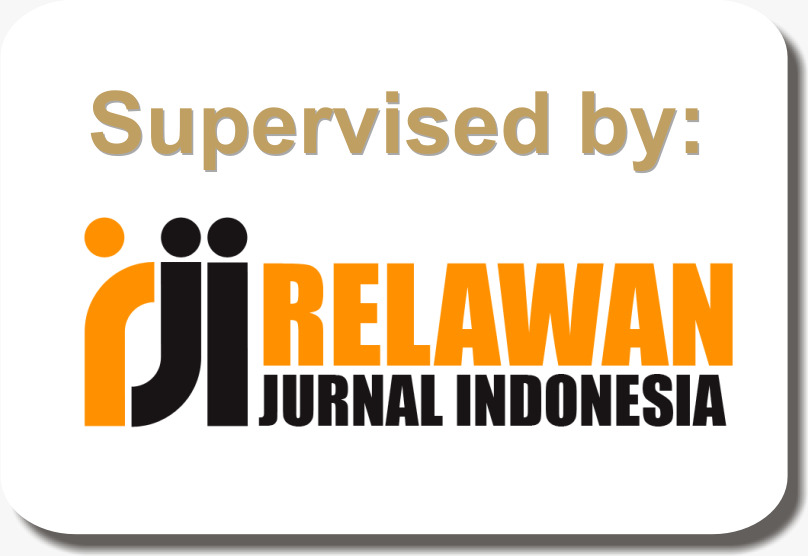Pengaruh Pemanfaatan Mobile Instant Messaging Terhadap Self-Efficacy dan Kemampuan Kognitif Siswa pada Materi Hukum Newton
DOI:
https://doi.org/10.30599/jti.v11i1.403Keywords:
Kemampuan kognitif, Mobile Instant Messaging (MIM), Self-efficacy, WhatsAppAbstract
Penelitian ini bertujuan untuk mengetahui pengaruh pemanfaatan mobile instant messaging (MIM) WhatsApp terhadap self efficacy dan kemampuan kognitif siswa pada materi Hukum Newton. Desain penelitian yang digunakan adalah non-equivalent control group design. Penelitian ini menggunakan subyek siswa SMAN 9 Bandar Lampung kelas XI MIPA 1 sebagai kelas kontrol dan kelas XI MIPA 2 sebagai kelas eksperimen yang berjumlah masing-masing 30 siswa pada Semester Ganjil Tahun Ajaran 2018/2019. Teknik analisis data yang digunakan adalah independent sample t-test untuk uji parametrik dan Mann-Withney U-test untuk uji non parametrik. Berdasarkan hasil analisis data, diperoleh bahwa rata-rata post-test self efficacy pada kelas eksperimen 80,1 sedangkan pada kelas kontrol 67,06. Rata-rata postest kemampuan kognitif siswa pada kelas eksperimen 81,33 dan pada kelas kontrol 73,66. Perbedaan kedua kelas baik pada self efficacy dan kemampuan kognitif sangat signifikan dimana nilai kelas eksperimen lebih tinggi dibandingkan nilai kelas kontrol. Dengan demikian, dapat disimpulkan bahwa self efficacy dan kemampuan kognitif siswa yang memperoleh pembelajaran berbantuan MIM WhatsApp lebih baik dibandingkan dengan kelas yang tidak menggunakan WhatsApp.
Downloads
References
Amry, A. B. (2014). The impact ofwhatsapp mobile social learning on the achievement and attitudes of female students compared with face to face learning in the classroom. European Scientific Journal, ESJ, 10(22), 116-136.
Abdelraheem, A. Y., & Ahmed, A. M. (2018). The Impact of Using Mobile Social Network Applications on Students' Social-Life. International Journal of Instruction, 11(2), 1-14. https://doi.org/10.12973/iji.2018.1121a
Alabdulkareem, S. A. (2015). Exploring the use and the impacts of social media on teaching and learning science in Saudi. Procedia-Social and Behavioral Sciences, 182, 213-224. https://doi.org/10.1016/j.sbspro.2015.04.758
Bansal, T., & Joshi, D. (2014). A study of students experiences of WhatsApp mobile learning. Global Journal of Human-Social Science Research. 14(4).
Barhoumi, C. (2015). The Effectiveness of WhatsApp Mobile Learning Activities Guided by Activity Theory on Students' Knowledge Management. Contemporary Educational Technology, 6(3), 221-238.
Bouhnik, D., & Deshen, M. (2014). WhatsApp goes to school: Mobile instant messaging between teachers and students. Journal of Information Technology Education: Research, 13(1), 217-231. https://doi.org/10.28945/2051
Chipunza, P. R. C. (2013). Using mobile devices to leverage student access to collaboratively-generated resources: A case of WhatsApp instant messaging at a South African University. In International Conference on Advanced Information and Communication Technology for Education (ICAICTE 2013).
Crescente, M. L., & Lee, D. (2011). Critical issues of m-learning: design models, adoption processes, and future trends. Journal of the Chinese institute of industrial engineers, 28(2), 111-123. https://doi.org/10.1080/10170669.2010.548856
Samudra, G. B., Suastra, I. W., & Suma, K. (2014). Permasalahan-permasalahan yang dihadapi siswa SMA di kota singaraja dalam mempelajari fisika. Jurnal Pendidikan dan Pembelajaran IPA Indonesia, 4(1).
Kustijono, R., & Zuhri, F. (2018). The use of Facebook and WhatsApp application in learning process of physics to train students’ critical thinking skills. In IOP Conference Series: Materials Science and Engineering (Vol. 296, No. 1, p. 012025). IOP Publishing. https://doi.org/10.1088/1757-899X/296/1/012025
OECD. (2016). Results Excellence and Equity In Education. OECD Publishing.
Naidoo, J., & Kopung, K. J. (2016). Exploring the use of WhatsApp in mathematics learning: A case study. Journal of Communication, 7(2), 266-273. https://doi.org/10.1080/0976691X.2016.11884907
Rambe, P., & Bere, A. (2013). Using mobile instant messaging to leverage learner participation and transform pedagogy at a South African University of Technology. British Journal of Educational Technology, 44(4), 544–561. https://doi.org/10.1111/bjet.12057
Pence, H. E. (2007). Preparing for the real Web generation. Journal of Educational Technology Systems, 35(3), 347-356. https://doi.org/10.2190/7116-G776-7P42-V110
Prescott, J., Wilson, S., & Becket, G. (2013). Facebook use in the learning environment: do students want this?. Learning, Media and Technology, 38(3), 345-350. https://doi.org/10.1080/17439884.2013.788027
Sobaih, A. E. E., Moustafa, M. A., Ghandforoush, P., & Khan, M. (2016). To use or not to use? Social media in higher education in developing countries. Computers in Human Behavior, 58, 296-305. https://doi.org/10.1016/j.chb.2016.01.002
Suana, W., Distrik, I. W., Herlina, K., Maharta, N., & Putri, N. M. A. A. (2019). Supporting Blended Learning Using Mobile Instant Messaging Application: Its Effectiveness and Limitations. International Journal of Instruction, 12(1), 1022. https://doi.org/10.29333/iji.2019.12165a
Suana, W., Maharta, N., Nyeneng, I. D., & Wahyuni, S. (2017). Design And Implementation Of Schoology-Based Blended Learning Media For Basic Physics I Course. Jurnal Pendidikan IPA Indonesia, 6(1), 170-178. https://doi.org/10.15294/jpii.v6i1.8648
Lin, T. J., Liang, J. C., & Tsai, C. C. (2015). Identifying Taiwanese university students’ physics learning profiles and their role in physics learning self-efficacy. Research in Science Education, 45(4), 605-624. https://doi.org/10.1007/s11165-014-9440-z
Wirtha, I. M., & Rapi, N. K. (2008). Pengaruh model pembelajaran dan penalaran formal terhadap penguasaan konsep fisika dan sikap ilmiah siswa sma negeri 4 singaraja. Jurnal Penelitian dan Pengembangan Pendidikan, 1(2), 15-29.









